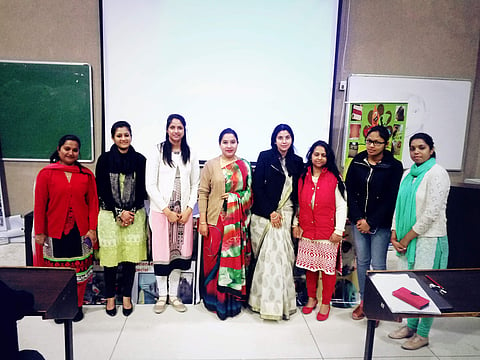

In order to empower women of rural Uttarakhand, a few female professors of the University of Petroleum and Energy Studies, Dehradun started theWomen Technology Park. Launched in 2015, the park is an attempt to help the local and rural women from the surrounding regions become economically independent, says Dr Neelu J Ahuja, a Senior Associate Professor in the Computation Research programme at the university, who also spearheads one of the projects. Her project enables women to make their products with the help of Information and Communication Technology (ICT).
The women power
Through this project, Dr Neelu and her team, which includes Dr Bhawna Y Lamba, Dr Kanchan D Bahukhandi and Dr Sapna Jain, who are also professors at the university, are trying to provide computer-assisted art and craft design training to enable rural women to reach a larger platform. But why rural women, we wonder. What potential do they see in them? "The women in rural areas are extremely talented. They know details about authentic fashion that we can never imagine. What they lack is the idea to market this talent. In fact, they don't even know their own worth," says Dr Neelu, adding, "The idea behind this project is to make the crafts industry more competitive, while they maintain their own aesthetic identity, differentiation, character and value.”
That's how they roll
Using natural resources, products ranging from traditional baskets to utility articles such as pen-holders, designer trays, casseroles, dustbins and innovative jewellery are designed by rural women, who have been trained in ICT skills ranging from the basics to design work. And the magic happens at the 1500 sq ft site constructed in Dehradun, where field assistants are recruited to keep tabs on the skill-learning process.
Women from nearby villages like Sahaspur, Bidholi, Bishanpur, Upper Kandoli, Pondha, Doonga, Misraspatti and Bakarna come to gain skills. "The women spend three hours every day at the workshop and learn these skills. We have provided them with all the infrastructure they need for the project. In return, the women have shown good response and they are willing to take some time out of their household chores to earn for themselves," says Dr Neelu.
It wasn't easy at all
The major challenge that the facilitators of the project faced was to convince the women to invest their time and energy into the project. "The women were not ready to accept that this can make them economically independent. Moreover, they did not want to become independent. But after a few counselling sessions, things were looking up and we attracted more women into the project," says Dr Neelu, who can proudly confirm that over 300 women have benefitted from the project.
"Women don't know their worth in this country, especially in the rural areas. They are mostly worried about the image and the logistics of the family. When the project started, we were asked all sorts of questions about the timings, location and duration of the project. They wanted to know how much money they would make at the end. They first needed assurance and only after that did they begin to trust us," she says. The rural women would often load the volunteers with requests like conducting classes near their houses instead of the campus. "This happened mostly during festivals when the family members did not appreciate them leaving the house," states Dr Neelu.
A never-give-up attitude paved the way for Dr Neelu as taking up this project wasn't an easy decision. A family woman herself, who already had a hectic eight-hour-shift job at the university, she knew that it wouldn’t be an easy ride, she confesses. "I knew that time management would be difficult, but there are some things in life that are worth it. I am fortunate to have a supportive family. I can help others and so I do. It’s as simple as that," says Dr Neelu, smiling.
A success story
What keeps Dr Neelu and her team motivated is the impact that they are making. "I remember this lady from Bidholi, who was so reluctant to join the programme, but once she did, there was no turning back. Today, she is one of the trainers at the site and it took her just six months to learn and teach the others.
